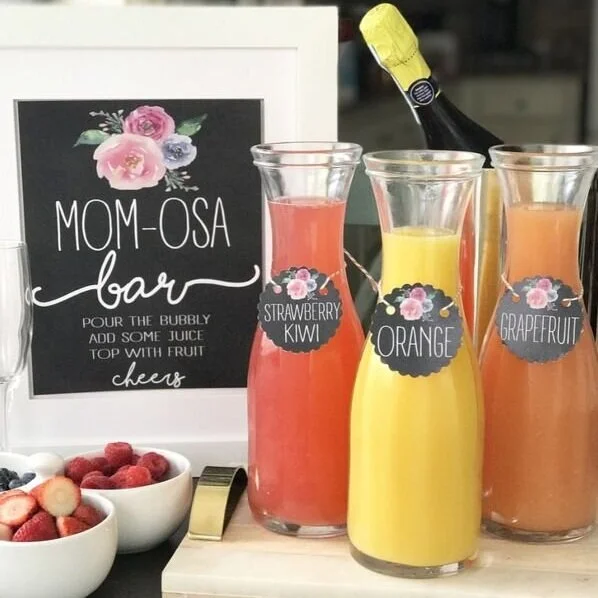Why MOMosas have to go
/Moms don’t need alcohol, they need support. Moms deserve more than a hangover.
By Blair Sharp
This article was originally published on Some Good Clean Fun on May 7, 2021.
You don’t have to look far to find what’s meant to be harmless cheeky boozy humor. It's on t-shirts (ahem, Target) and wine glasses that say “I wine because they whine,” or “mommy’s sippy cup.” MOM-osas celebrate moms-to-be at baby showers, and we throw “Sip and Sees” for new mothers to show off their babies. Before, during, and after pregnancy, alcohol surrounds mothers.
MOM-osa is a particularly irksome term. It proliferates through social media as we approach Mother’s Day every year, and for the new mom in your life you can buy anything from a MOM-osa baby shower sets to favors to go along with it.
You can find countless places online for the best MOM-osa recipe. Because what could be better to show your mother that you care for her than some ethanol, am I right? She’ll know you appreciate her when she wakes up with a headache and crippling anxiety the next day! That’s real love right there. I digress.
Along with the bloody mary, mimosas have long been a brunch staple. The history of the mimosa dates back to 1925 Paris where a bartender named Frank Meier is said to have invented the cocktail by mixing equal parts of champagne and orange juice. Europeans brought the drink to New York in the 1960s. Its popularity rose as a day-drinking beverage later that decade in New Jersey.
Today, you’re likely to find mimosas on any brunch menu, often in various flavors. To get you in their doors, many restaurants advertise all-you-can-drink or bottomless mimosas. If you’re like me and can’t stop at one, this is a big problem. But that’s a topic for another day. How did mimosas become the iconic drink of classy, but overstressed moms?
Like Big Tobacco did in the 1920s, Big alcohol companies have switched gears. They’ve set their target on women. Wine now comes in cans and pink bottles make drinks more feminine (hello, why do you think ‘rose all day’ became a thing?). They target women because women believe that they need what they're selling. In the 20s women thought cigarettes helped them stay thin. Today they think they need alcohol to relax and to be happy.
Okay okay, I know what you’re thinking...What's the big deal?
The problem lies in the name “MOM-osa” itself. When we add the word MOM into the name of the drink, we are saying that this alcoholic beverage is best suited for mothers. What we’re forgetting is that those moms require more than what alcohol can give them. Moms need support. They need a break. They need time to themselves, and those things are often hard to come by.
In the last year alone, parents have been challenged more than ever before. Moms especially have had a hard time, but this isn't new. The COVID-19 pandemic just compounded the existing challenges for mothers. They’re leaving their jobs or working from home, because, well...they have no choice. Many are also taking on the role of teacher and primary caregiver for their kids. For so many moms, work was their getaway. They drop off the kids and get to be around adults for a while. They have conversations that don't include poop and peanut butter sandwiches. If they’re quitting their jobs or working from home, where are they supposed to find this adult time now?
But I’m stuck at home and my kids are a handful so drinking helps me relax...
Sort of. The “good” feeling you get from drinking alcohol lasts for only a short time - which alcohol marketing never addresses. Although you think you’re relaxing, that feeling wears off. You're left wanting more because you’re feeling even worse, and so you consume more to get that same elation and relaxation. It’s a slippery slope. Alcohol disrupts your sleep and leaves you more fatigued the next day. This can in turn make you more irritable and less relaxed than you were to begin with. Later that day, you need to relax again, so you drink. The cycle of anxiety and drinking continues (for more on rethinking wine-to-unwind, check out this podcast where scientist Gillian Tiez explains why you think alcohol helps your anxiety!).
The bottom line here is that we need to be aware of what alcohol is doing to us. It’s not helping moms, and the messaging we are sending is harmful. Moms don’t need alcohol, they need support. Moms deserve more than a hangover.
About the Author
Blair is an alcohol-free wife and mom from Minnesota. She works full-time outside of the home, and also does freelance writing. She is a staff writer and contributor for a parenting resource in her city. In her free time she likes to watch reality television, eat cheese, and do other introverted activities. She is a host for 1000 Hours Dry Parents and you can find her creating on Instagram @sobrietyactivist and on her website www.blairsharp.com.






